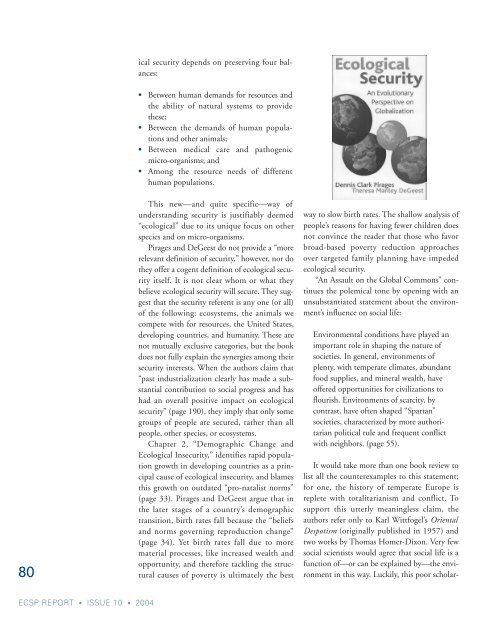Environmental Change and Security Project Report - Woodrow ...
Environmental Change and Security Project Report - Woodrow ...
Environmental Change and Security Project Report - Woodrow ...
You also want an ePaper? Increase the reach of your titles
YUMPU automatically turns print PDFs into web optimized ePapers that Google loves.
ical security depends on preserving four balances:<br />
• Between human dem<strong>and</strong>s for resources <strong>and</strong><br />
the ability of natural systems to provide<br />
these;<br />
• Between the dem<strong>and</strong>s of human populations<br />
<strong>and</strong> other animals;<br />
• Between medical care <strong>and</strong> pathogenic<br />
micro-organisms; <strong>and</strong><br />
• Among the resource needs of different<br />
human populations.<br />
80<br />
This new—<strong>and</strong> quite specific—way of<br />
underst<strong>and</strong>ing security is justifiably deemed<br />
“ecological” due to its unique focus on other<br />
species <strong>and</strong> on micro-organisms.<br />
Pirages <strong>and</strong> DeGeest do not provide a “more<br />
relevant definition of security,” however, nor do<br />
they offer a cogent definition of ecological security<br />
itself. It is not clear whom or what they<br />
believe ecological security will secure. They suggest<br />
that the security referent is any one (or all)<br />
of the following: ecosystems, the animals we<br />
compete with for resources, the United States,<br />
developing countries, <strong>and</strong> humanity. These are<br />
not mutually exclusive categories, but the book<br />
does not fully explain the synergies among their<br />
security interests. When the authors claim that<br />
“past industrialization clearly has made a substantial<br />
contribution to social progress <strong>and</strong> has<br />
had an overall positive impact on ecological<br />
security” (page 190), they imply that only some<br />
groups of people are secured, rather than all<br />
people, other species, or ecosystems.<br />
Chapter 2, “Demographic <strong>Change</strong> <strong>and</strong><br />
Ecological Insecurity,” identifies rapid population<br />
growth in developing countries as a principal<br />
cause of ecological insecurity, <strong>and</strong> blames<br />
this growth on outdated “pro-natalist norms”<br />
(page 33). Pirages <strong>and</strong> DeGeest argue that in<br />
the later stages of a country’s demographic<br />
transition, birth rates fall because the “beliefs<br />
<strong>and</strong> norms governing reproduction change”<br />
(page 34). Yet birth rates fall due to more<br />
material processes, like increased wealth <strong>and</strong><br />
opportunity, <strong>and</strong> therefore tackling the structural<br />
causes of poverty is ultimately the best<br />
way to slow birth rates. The shallow analysis of<br />
people’s reasons for having fewer children does<br />
not convince the reader that those who favor<br />
broad-based poverty reduction approaches<br />
over targeted family planning have impeded<br />
ecological security.<br />
“An Assault on the Global Commons” continues<br />
the polemical tone by opening with an<br />
unsubstantiated statement about the environment’s<br />
influence on social life:<br />
<strong>Environmental</strong> conditions have played an<br />
important role in shaping the nature of<br />
societies. In general, environments of<br />
plenty, with temperate climates, abundant<br />
food supplies, <strong>and</strong> mineral wealth, have<br />
offered opportunities for civilizations to<br />
flourish. Environments of scarcity, by<br />
contrast, have often shaped “Spartan”<br />
societies, characterized by more authoritarian<br />
political rule <strong>and</strong> frequent conflict<br />
with neighbors. (page 55).<br />
It would take more than one book review to<br />
list all the counterexamples to this statement;<br />
for one, the history of temperate Europe is<br />
replete with totalitarianism <strong>and</strong> conflict. To<br />
support this utterly meaningless claim, the<br />
authors refer only to Karl Wittfogel’s Oriental<br />
Despotism (originally published in 1957) <strong>and</strong><br />
two works by Thomas Homer-Dixon. Very few<br />
social scientists would agree that social life is a<br />
function of—or can be explained by—the environment<br />
in this way. Luckily, this poor scholar-<br />
ECSP REPORT • ISSUE 10 • 2004

















